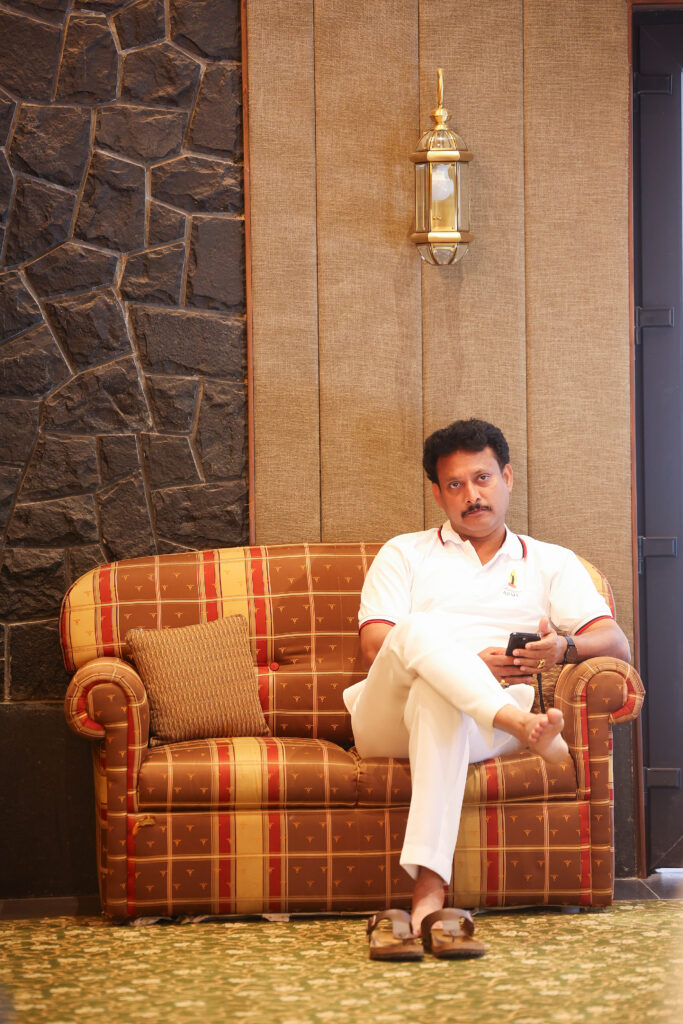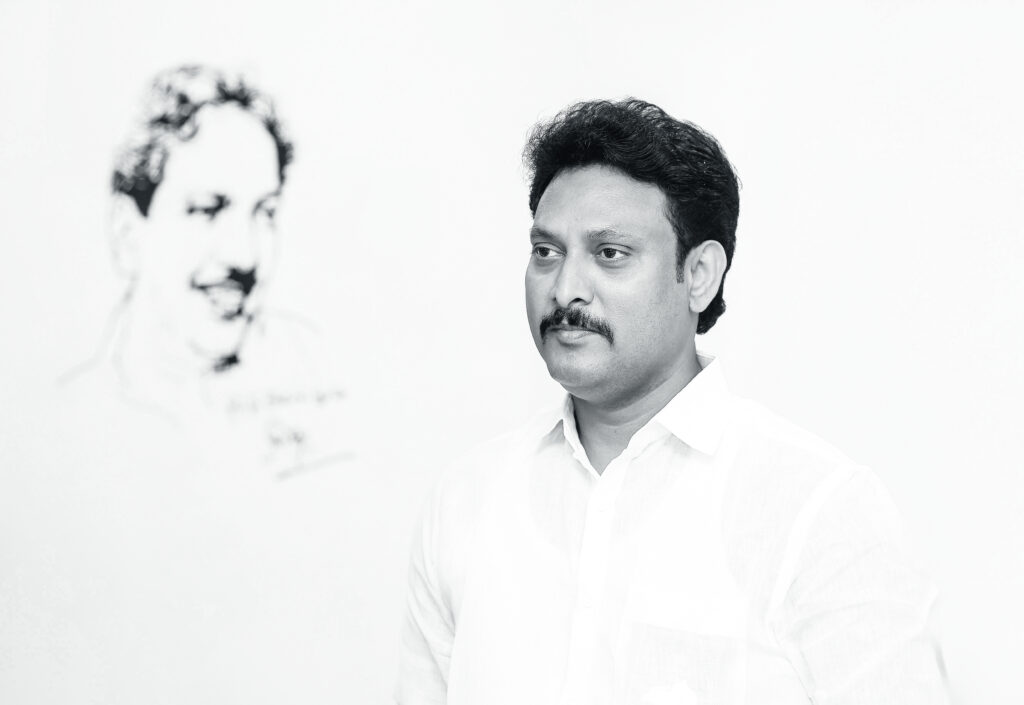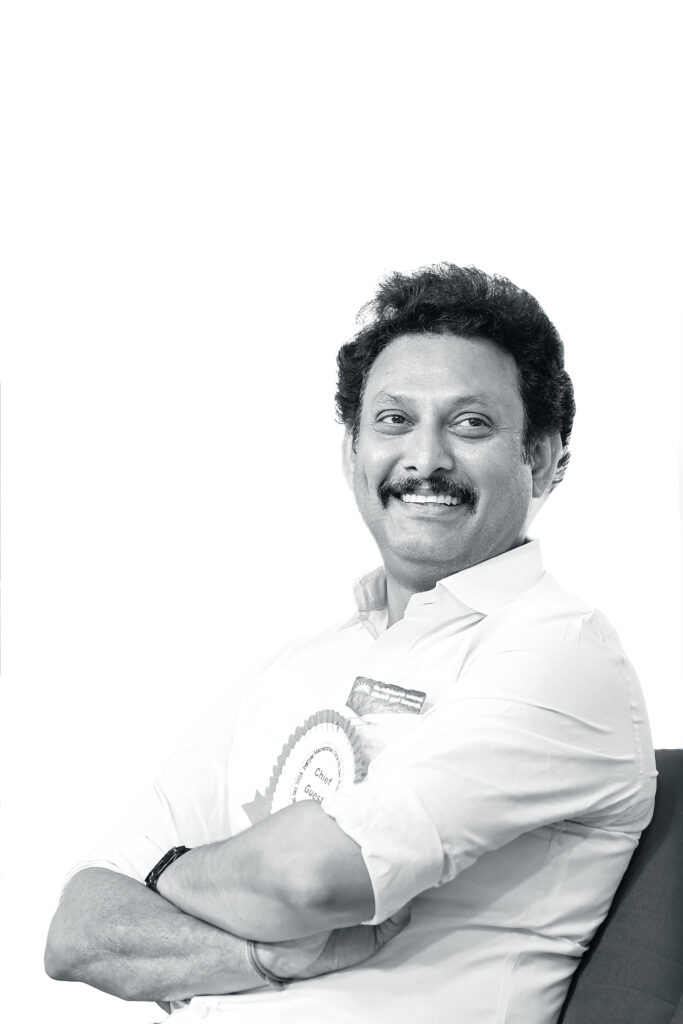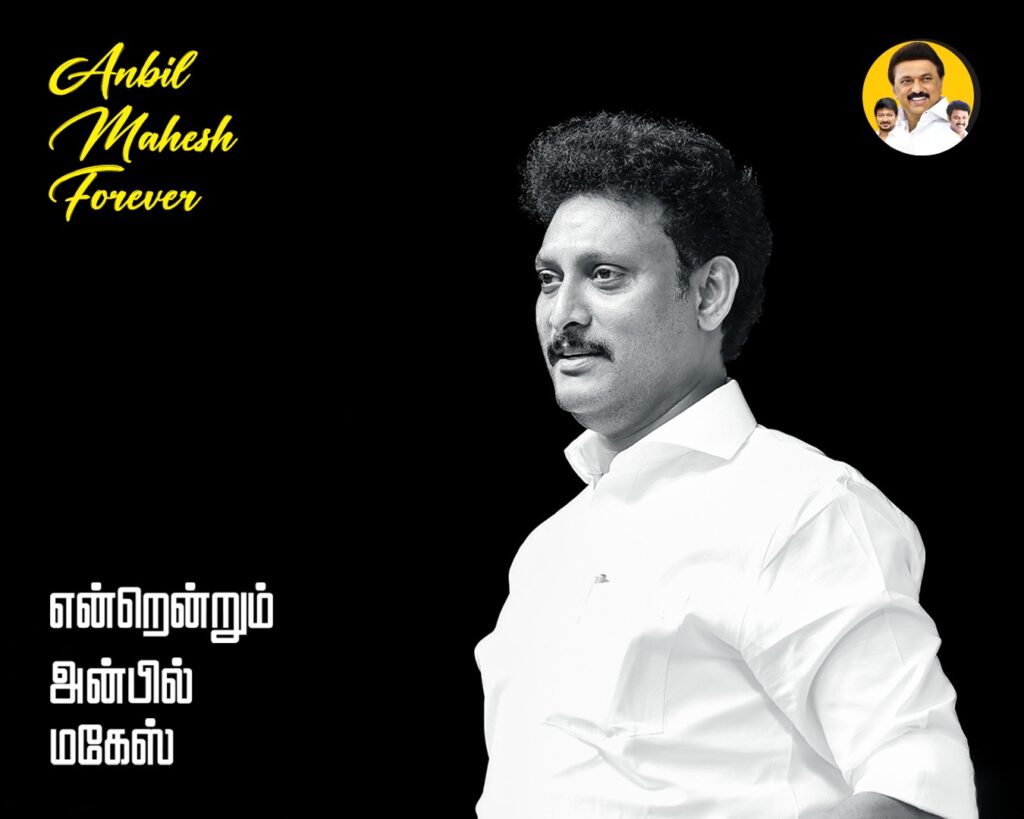In the political landscape of Tamil Nadu, where legacy and ideology often intertwine, Anbil Mahesh Poyyamozhi stands out as a young reformist voice echoing the values of the Dravidian movement while embracing the challenges of 21st-century education. As TaIn the political landscape of Tamil Nadu, where legacy and ideology often intertwine, Anbil Mahesh Poyyamozhi stands out as a young reformist voice echoing the values of the Dravidian movement while embracing the challenges of 21st-century education. As Tamil Nadu’s Minister for School Education since 2021, he has emerged as one of the most hands-on and reform-driven ministers in the state’s recent history.
Inheriting a Legacy, Crafting a Vision
Born into a politically active family rooted in the DMK’s history, Anbil Mahesh didn’t merely inherit his role — he carved his own path within it. His grandfather, Anbil P. Dharmalingam, was a towering figure during the formative years of the DMK. His father, Anbil Poyyamozhi, was also a legislator. But unlike many second- and third-generation politicians who lean heavily on their surnames, Mahesh chose to connect with people through fieldwork and grassroots involvement.
His rise in the DMK youth wing during the 2000s coincided with a broader generational shift in Tamil Nadu politics. His political maturity became evident when he contested and won the Thiruverumbur constituency in 2016 and again in 2021 with a wider margin, at a time when education had become a battleground for ideological contestation between state and centre.

A Minister on the Move
Once he assumed office as Minister for School Education in 2021, Anbil Mahesh took a radically different approach from his predecessors. He became one of the few ministers to physically inspect government schools across all 234 constituencies in the state. These inspections weren’t mere photo-ops. His team developed a set of 77 measurable indicators to assess schools, ranging from infrastructure and sanitation to learning outcomes and teacher performance (The Hindu, Dec 2023).
This bottom-up model of monitoring, unheard of in most Indian states, was not about punishment, but about building data-driven accountability. It’s this practical style — walking into classrooms, speaking directly to students and teachers — that has made him a popular figure among educators and parents alike.

Also Read : Capturing Leadership: Action Shots of Anbil Mahesh Poyyamozhi
Policy Innovation Rooted in Equity
Under his leadership, Tamil Nadu launched several flagship schemes. The Illam Thedi Kalvi (Education at the Doorstep) program emerged during the COVID-19 pandemic, providing volunteer-led neighborhood learning sessions for children who had lost touch with school. Nearly 2 lakh volunteers signed up across districts, marking one of the largest community-driven educational recovery programs in India (Times of India, 2022).
He followed this with the Ennum Ezhuthum mission in 2022, aimed at achieving foundational literacy and numeracy for students up to Class 3 — aligning with global education targets like those set by UNESCO. Additionally, the Breakfast Scheme, a first-of-its-kind in India, ensured that lakhs of schoolchildren from government schools received free morning meals, improving nutrition and attendance simultaneously (Indian Express, 2023).
Standing Apart in a National Debate
In the backdrop of the controversial National Education Policy (NEP-2020) brought by the Union Government, Tamil Nadu stood firm in its opposition — and Mahesh became its articulate defender. He has consistently argued that the NEP undermines the rights of states, imposes Hindi and Sanskrit at the cost of regional languages, and promotes a centralized education model that ignores ground realities in states like Tamil Nadu (NDTV, July 2021).
Instead, Mahesh and the DMK government announced the drafting of a State Education Policy — a counter-model to NEP — that reflects Tamil Nadu’s social justice ethos, its success in universal education, and its emphasis on language plurality and secular curriculum.

Embracing Inclusion and Innovation
In 2024, Mahesh launched Tamil Nadu’s first remedial learning lab for children with dyslexia and other learning disabilities — the DLearners 3R Lab — at a Chennai school. The initiative brings technology and pedagogy together to offer online and offline support for slow learners (The Hindu, Feb 2024).
Notably, he also announced that climate change and environmental sustainability would become a part of the school curriculum from 2024–25 onwards, pushing Tamil Nadu into the league of progressive education models that align with global sustainable development goals.
Future Pathways
With his consistent ground presence, policy clarity, and firm ideological compass, Anbil Mahesh is slowly emerging as a key face in the DMK’s future leadership narrative. His ability to balance grassroots sensibilities with technocratic governance is rare among Indian ministers. While education reform is a long road, his tenure has set a strong foundation for systemic transformation.
Whether it’s his vocal stance on protecting Tamil identity, his deep engagement with school ecosystems, or his readiness to challenge top-down national frameworks, Anbil Mahesh Poyyamozhi represents a blend of political conviction and administrative innovation — a combination Tamil Nadu’s educational landscape desperately needs.mil Nadu’s Minister for School Education since 2021, he has emerged as one of the most hands-on and reform-driven ministers in the state’s recent history.
Inheriting a Legacy, Crafting a Vision
Born into a politically active family rooted in the DMK’s history, Anbil Mahesh didn’t merely inherit his role — he carved his own path within it. His grandfather, Anbil P. Dharmalingam, was a towering figure during the formative years of the DMK. His father, Anbil Poyyamozhi, was also a legislator. But unlike many second- and third-generation politicians who lean heavily on their surnames, Mahesh chose to connect with people through fieldwork and grassroots involvement.
His rise in the DMK youth wing during the 2000s coincided with a broader generational shift in Tamil Nadu politics. His political maturity became evident when he contested and won the Thiruverumbur constituency in 2016 and again in 2021 with a wider margin, at a time when education had become a battleground for ideological contestation between state and centre.
A Minister on the Move
Once he assumed office as Minister for School Education in 2021, Anbil Mahesh took a radically different approach from his predecessors. He became one of the few ministers to physically inspect government schools across all 234 constituencies in the state. These inspections weren’t mere photo-ops. His team developed a set of 77 measurable indicators to assess schools, ranging from infrastructure and sanitation to learning outcomes and teacher performance (The Hindu, Dec 2023).
This bottom-up model of monitoring, unheard of in most Indian states, was not about punishment, but about building data-driven accountability. It’s this practical style — walking into classrooms, speaking directly to students and teachers — that has made him a popular figure among educators and parents alike.
Policy Innovation Rooted in Equity
Under his leadership, Tamil Nadu launched several flagship schemes. The Illam Thedi Kalvi (Education at the Doorstep) program emerged during the COVID-19 pandemic, providing volunteer-led neighborhood learning sessions for children who had lost touch with school. Nearly 2 lakh volunteers signed up across districts, marking one of the largest community-driven educational recovery programs in India (Times of India, 2022).
He followed this with the Ennum Ezhuthum mission in 2022, aimed at achieving foundational literacy and numeracy for students up to Class 3 — aligning with global education targets like those set by UNESCO. Additionally, the Breakfast Scheme, a first-of-its-kind in India, ensured that lakhs of schoolchildren from government schools received free morning meals, improving nutrition and attendance simultaneously (Indian Express, 2023).

Standing Apart in a National Debate
In the backdrop of the controversial National Education Policy (NEP-2020) brought by the Union Government, Tamil Nadu stood firm in its opposition — and Mahesh became its articulate defender. He has consistently argued that the NEP undermines the rights of states, imposes Hindi and Sanskrit at the cost of regional languages, and promotes a centralized education model that ignores ground realities in states like Tamil Nadu (NDTV, July 2021).
Instead, Mahesh and the DMK government announced the drafting of a State Education Policy — a counter-model to NEP — that reflects Tamil Nadu’s social justice ethos, its success in universal education, and its emphasis on language plurality and secular curriculum.
Embracing Inclusion and Innovation
In 2024, Mahesh launched Tamil Nadu’s first remedial learning lab for children with dyslexia and other learning disabilities — the DLearners 3R Lab — at a Chennai school. The initiative brings technology and pedagogy together to offer online and offline support for slow learners (The Hindu, Feb 2024).
Notably, he also announced that climate change and environmental sustainability would become a part of the school curriculum from 2024–25 onwards, pushing Tamil Nadu into the league of progressive education models that align with global sustainable development goals.

Future Pathways
With his consistent ground presence, policy clarity, and firm ideological compass, Anbil Mahesh is slowly emerging as a key face in the DMK’s future leadership narrative. His ability to balance grassroots sensibilities with technocratic governance is rare among Indian ministers. While education reform is a long road, his tenure has set a strong foundation for systemic transformation.
Whether it’s his vocal stance on protecting Tamil identity, his deep engagement with school ecosystems, or his readiness to challenge top-down national frameworks, Anbil Mahesh Poyyamozhi represents a blend of political conviction and administrative innovation — a combination Tamil Nadu’s educational landscape desperately needs.

Follow us
Whatsapp Channel – bit.ly/anbilmahesh4evr
X ID – https://x.com/AnbilMahesh4evr
Youtube – https://youtube.com/@AnbilMahesh4evr
Facebook – https://fb.com/AnbilMahesh4evr
Instagram – https://instagram.com/AnbilMahesh4evr

Pingback: பள்ளிக்கல்வித் துறை: திட்டங்கள், பயனர்கள் - ஓர் தொகுப்பு! - Anbil Mahesh Forever